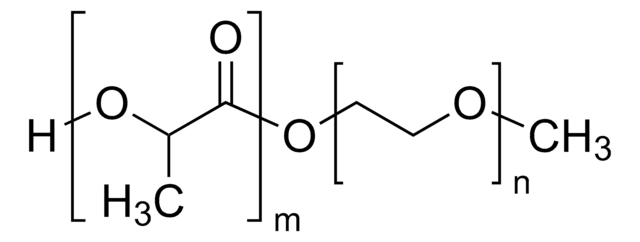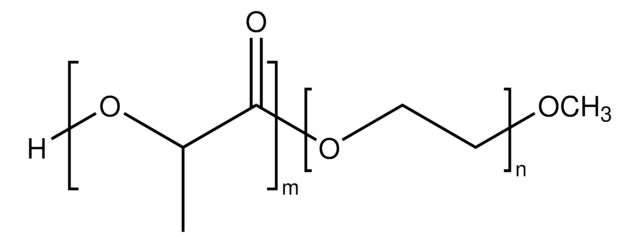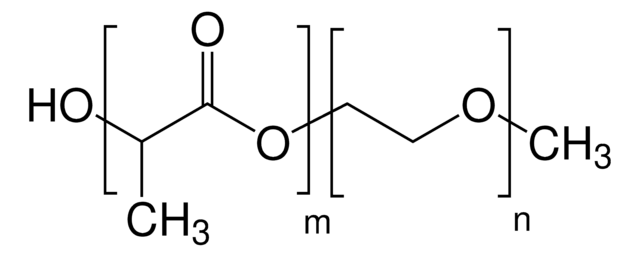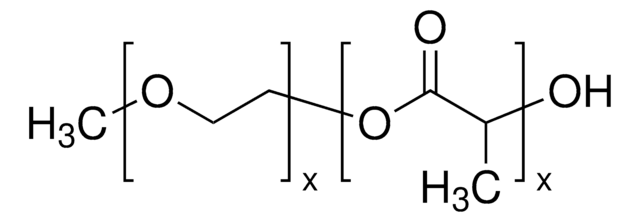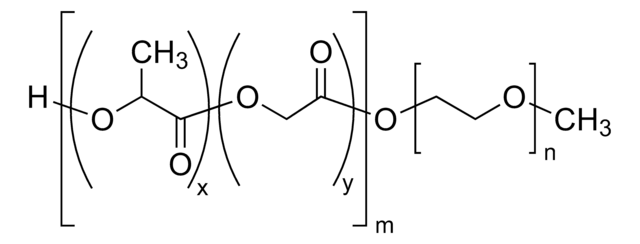764736
Poly(ethylene glycol) methyl ether-block-poly(D,L lactide)-block-decane
PEG average Mn 2,000, PDLLA average Mn 2,000
Sinónimos:
PEG-PDLLA-decane, PEG-b-PLA-b-decane, PEG-PLA
About This Item
Productos recomendados
formulario
pellets
Nivel de calidad
mol peso
PDLLA average Mn 2,000
PEG average Mn 2,000
average Mn 4,000 (total)
marco temporal de la degradación
2-5 weeks
temperatura de transición
Tm 29-33 °C
PDI
<1.1 (typical PEG)
<1.2
<1.3 (overall)
temp. de almacenamiento
2-8°C
Categorías relacionadas
Descripción general
Aplicación
Características y beneficios
- Good biocompatibility, low immunogenicity and good degradability.
- Properties can be easily modulated by changing the block copolymer segment sizes to suit a particular application.
Código de clase de almacenamiento
11 - Combustible Solids
Clase de riesgo para el agua (WGK)
WGK 3
Punto de inflamabilidad (°F)
>230.0 °F
Punto de inflamabilidad (°C)
> 110 °C
Elija entre una de las versiones más recientes:
Certificados de análisis (COA)
¿No ve la versión correcta?
Si necesita una versión concreta, puede buscar un certificado específico por el número de lote.
¿Ya tiene este producto?
Encuentre la documentación para los productos que ha comprado recientemente en la Biblioteca de documentos.
Los clientes también vieron
Artículos
One of the common difficulties with intravenous drug delivery is low solubility of the drug. The requirement for large quantities of saline to dissolve such materials limits their clinical use, and one solution for this problem that has recently generated interest is the formation of drug-loaded micelles.
Local delivery of bioactive molecules using an implantable device can decrease the amount of drug dose required as well as non-target site toxicities compared to oral or systemic drug administration.
Microparticle drug delivery systems have been extensively researched and applied to a wide variety of pharmaceutical and medical applications due to a number of advantages including injectability, local applicability to target tissues and sites, and controlled drug delivery over a given time period.
Aliphatic polyesters such as polylactide, poly(lactide-co-glycolide) and polycaprolactone, as well as their copolymers, represent a diverse family of synthetic biodegradable polymers that have been widely explored for medical uses and are commercially available.
Nuestro equipo de científicos tiene experiencia en todas las áreas de investigación: Ciencias de la vida, Ciencia de los materiales, Síntesis química, Cromatografía, Analítica y muchas otras.
Póngase en contacto con el Servicio técnico